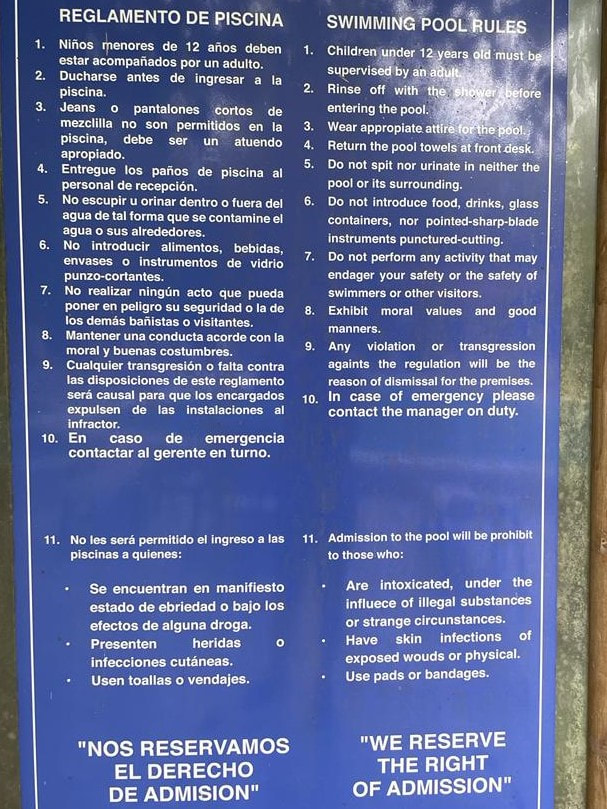The photograph above shows an English translation (from Spanish) of a list of rules to be observed in a swimming pool. It is not at all difficult to understand, and it starts off reasonably well. However it contains poor choices of prepositions: “at front desk”, instead of “to the front desk”; missing articles; adjectives that follow the noun when they should come before, verbs that would not normally be used in English (“introduce”), incorrect verb endings, e.g. “prohibit”, when it should be “prohibited”, use of a singular that should be a plural, i.e. “regulation”, instead of “regulations”, and spelling errors, e.g. “wouds” instead of “wounds”; “influece” when it should be “influence”.
Are these minor details that would never prevent a holiday-maker using the facilities from enjoying the recreation? Am I being pedantic? Perhaps. But to me, it’s a sign of lack of care, attention to detail, and it does not present the organisation, in this case a hotel, in a good light.
Arguably, it is only texts such as legal documents, for example contracts, where the understanding and thereby the agreement between the parties must be made absolutely clear or, in the case of my own work, medical records, in which precision in the reporting is essential for obvious reasons, where attention to detail really matters.
But one question that comes to my mind is this. If we reflect on the huge attention to detail paid to almost every other aspect of presentation in, to remain with this example, a fairly luxurious hotel: the careful positioning of the cutlery, napkins and wineglasses at the dinner table, the meticulous way in which the soaps and towels have been arranged in the bathroom, the impeccable standard of cleaning, the painstaking work of the gardeners, the luxurious comfort of the furniture in the lobby, why then is the translation of a few instructions deemed to be so insignificant? After all, waiters might get disciplinary action if they made mistakes in a restaurant. I’ve even seen examples of poor English in display cabinets or information boards in the most prestigious museums in capital cities.
Among the many possibly undesirable costs of mistranslation, the newsletter and digital magazine Marketing Gazette cites mistakes that cause a negative reaction among potential clients, problems relating to gender, where the advertisement for a product may be targeted at the wrong audience due to the non-recognition of a masculine or feminine possessive pronoun or verb, and unthinkable consequences for hospital patients due to the incorrect translation of manuals for operating medical devices. Loss of money, loss of clients, health implications, legal implications....these have all been recorded.
Even more alarming is that it is now widely acknowledged in academic circles that the immaculate conception of Jesus, narrated in the gospels of Matthew and Luke, was a mistranslation, the original Hebrew word meaning “young”, as opposed to “virgin”. This is significant because it removes the rather supernatural dimension to the story and shatters the somewhat unjust and hypocritical concept that girls and young women should strive to emulate this alleged purity. The ramifications of this translation error cannot be exaggerated: it has fuelled a belief that the church has propagated for hundreds of years. One writer on the bibleodyssey.org site points out that “the virgin birth of Jesus is a cornerstone of Christianity, (and, as it happens, is important in Islam as well)”.
So why does mistranslation and poor translation happen, and why is it allowed to slip through the net?
Perhaps people overestimate the accuracy of machine translation and assume that a quick cut and paste into their chosen MT device will give them a precise rendering of their text without having to pay for it. Whilst the machines are definitely getting better, there is still some way to go, and it remains highly unlikely that they will produce the expected results without some degree of human intervention. Or perhaps the not-quite-right-but-well-they’ll-know-what-we-mean approach is considered acceptable and of no consequence.
But I suspect that the main reason is that many individuals or companies who need translated material are simply unaware of how vital it is that the text is translated or at least checked by a native speaker. Unless the target language is the mother tongue of the person responsible, the results are probably going to be poor at best, and could have far-reaching outcomes. I imagine that this problem occurs when someone who speaks the desired language fairly fluently is confident that they can do the translation, without training or experience in this very specific skill. They assume that what they have written is correct and, unaware of the need to have it checked by a native speaker, send it for printing or publishing, and when you go travelling you can see the results all around you.
My mother tongue is English and, although I can comfortably converse in French or Italian, I would never dream of translating from English into either of those languages. I’m often surprised at how surprised other people are when I tell them that. In my opinion, it is this lack of awareness of the importance of this very issue that is at the heart of the problem. I translate a sentence, check it against the source material, check it again, then read out the English to myself to make sure it flows well. I move onto the next sentence, and in this blow-by-blow fashion work my way through to the end of the document. Then I go through again, checking each line against the original, then read through the entire English translation, with an objective view, as though seeing it for the first time. On the few occasions where an error has been pointed out to me after delivering a document to a client, I have been mortified. This is one reason why I find it demoralising to see a bad job, as if the writer had been careless or unaware.
I would very much like to see greater prominence attached to the art of translation. If it’s so important to get the knife on the right and the fork on the left, let’s at least get the menu in order as well!



 RSS Feed
RSS Feed